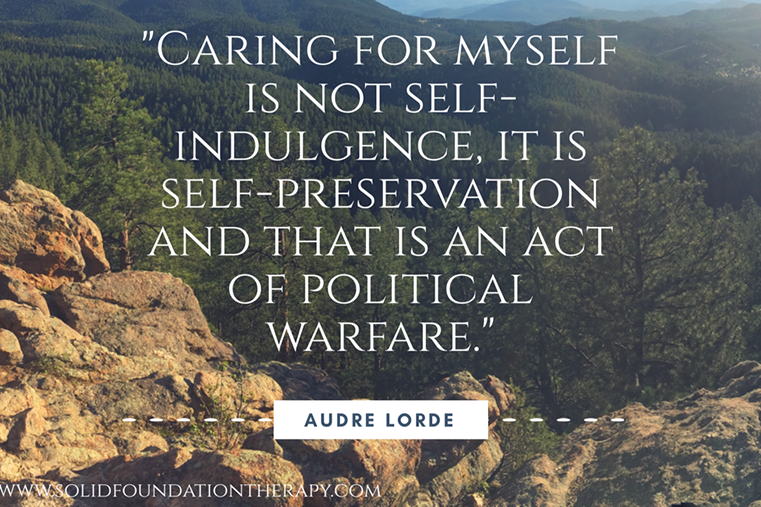
We are pleased to offer both in-person and teletherapy services at this time. Current clients please use our client portal to update your information. For information on becoming a client please call or email us.
Blog
Blog Articles

Building and Maintaining Boundaries: an unexpected form of self-care
Lindsey Davis, September 10, 2017
Self-Care Part 1
The phrase “self-care” is thrown around quite a bit these days. I’ve heard many different forms of the idea in mainstream media like the TV show Parks and Recreation (ABC) when two of my favorite characters, Tom and Donna coin the term “Treat Yo’ Self” and embark on a fabulous day of shopping and spa treatments. In that episode, Ben, another character, learns the joy of spending a day caring for oneself. While this hilarious episode does help demonstrate the importance of taking time to focus on oneself, self-care is a bit more rich than this.
In my journey as a counselor, I have learned that self-care is a process in which we first learn to understand the needs of our bodies, hearts, and minds in order for us to feel happy, healthy, and effective in our lives. When we learn to take time to check in with ourselves we can figure out if something is missing in our lives or if something needs more of our attention. For example, we may not really understand the importance of checking the fluids in our car until the antifreeze is too low and our car overheats, destroying the engine. Similarly, if we are low on sleep our brain doesn’t have a chance to perform vital functions that are integral to learning, memory and our judgment.
Self-care is when we ask ourselves “how am I doing right now?”
First, I think to myself “how is my body?” How is my sleep? Am I eating well lately? Am I getting enough exercise? Did I drink enough water today? Am I getting enough sun or time outside? Are my muscles tight? Am I getting enough hugs from the people I love? When was the last time I stretched or got up to walk around? Am I due for an appointment with my Primary Care Provider? Did I take my medications today? Taking time to check in with our bodies can clue us into whether or not we are maintaining our most important vehicle for transportation. With our cars, we make sure we have enough gas, we monitor our oil and other fluids, we check the tire treads, and if we are feeling really good we might even wash our cars despite the unpredictable Colorado weather! Shouldn’t we do the same for our bodies?
Second, I check in with my heart. This might sound a little cheesy at first but I tell all of my clients “emotions are information!” What is it my emotions are trying to tell me? Do I feel angry with my partner because they left dishes in the sink or is it really because we’ve both been so busy that we haven’t spent any quality time together in several days? When I feel impatient with a co-worker, I try to understand what the impatience is trying to tell me: do I really feel impatient with myself because I think I could have done more? And could I really have done more or was I doing the best I could at the time? If we continue with the car analogy, let’s think of emotions like the check engine light that comes on when the car needs something. We can choose to ignore the light or we can plug the code reader into the car and find out what the light is trying to tell us. If checking in with your emotions is new to you, try starting by paying attention to what is happening in your body (heart rate, temperature, queasy feeling in stomach, tight muscles, etc.).
Third, “how is my thinking?” What do I know about myself right now? Where am I in the story of my life? Do I like this chapter of my life? When I notice that I seem to be stuck on a particular thought about myself or someone else, I ask “what is the story I am telling myself right now?” I actually got this incredibly helpful question from Brene’ Brown’s recent book, Rising Strong (2015). This book came to me during a difficult time in my life and it continue to help me slow down my thoughts when I’m feeling overwhelmed. When I notice that I’m having a strong emotional reaction to an event and I’m having a hard time trying to understand what my emotions are telling me, I think “the story I am making up right now is…” and then everything starts to flow. For example, when my partner and I get into a heated fight about the dishes left in the sink, I might stop and say out loud “The story I’m making up is that you are annoyed about the dishes in the sink because you really think that I’m a bad wife and a lazy person and I’d rather be angry with you than feel incompetent.” Brene’ Brown also calls this the Shitty First Draft or SFD for short in Rising Strong. This is an excellent tool for slowing things down so we can get the entire picture. In regards to our car metaphor, the thoughts are the driver of the car. Is our driver distracted or focused? If the driver is distracted, they may not be alert enough to react in time to dangers on the road (i.e. avoid getting into a big fight over dishes in the sink).
Understanding our body, heart, and mind is the first step in the process of self-care. After all, how can we learn to care for a car until we learn to pay attention to the needs of a car such as gas, oil, good tires, etc.?
Please stay tuned for our next article on self-care where we will explore the different areas of our lives that may need more attention. Hint: it’s more than just exercise and eating right!
If you are interested in scheduling a free consultation in person or over the phone call today (720) 577-5994.
The information contained herein is not therapeutic advice nor a substitute for therapy. It should not be used to diagnose or treat any mental health problem. If you are located within the United States and you need emergency assistance please call 911 or go to your nearest emergency room. If you are located within Colorado you may also call the Colorado Crisis Line at 844-493-TALK (8255).







